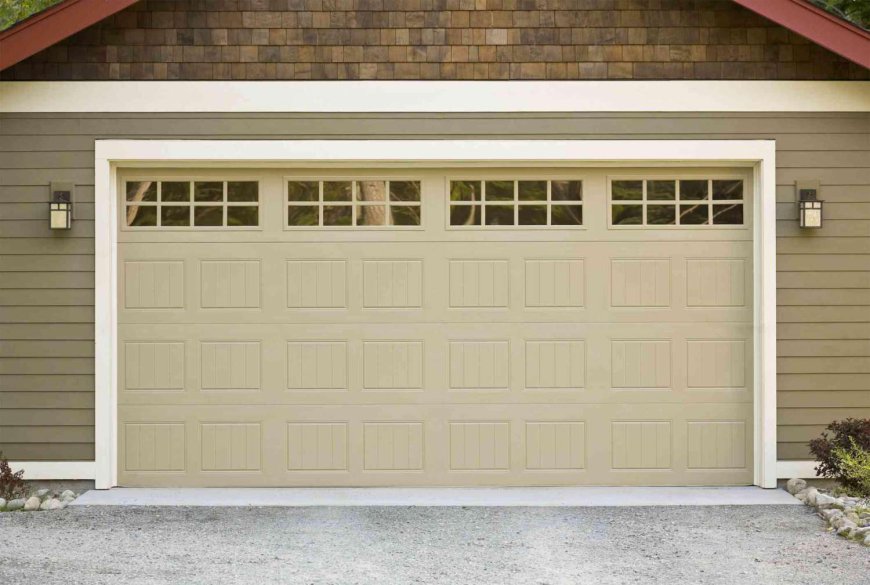The Most Common Garage Door Repairs and How to Prevent Them

Garage doors are essential to modern homes, offering security, convenience, and aesthetic value.
However, they are not immune to wear and tear. Knowing the most common garage door issues and how to prevent them can save time, money, and frustration.
Here, we explore these common problems and provide practical tips to keep your garage door operating smoothly.
1. Broken Springs
The Problem
Garage door springs bear the brunt of your door's weight, helping it lift and lower smoothly. Over time, they weaken and may eventually snap.
A broken spring can make the door difficult or impossible to open.
How to Prevent It
-
Regular Inspections: Check the condition of the springs every six months for signs of wear, rust, or gaps.
-
Routine Lubrication: Apply a high-quality lubricant to the springs to reduce friction and prevent rust.
-
Professional Maintenance: Have a professional inspect and balance the springs annually to ensure they are in good working condition.
2. Misaligned Tracks
The Problem
Garage door tracks guide the door as it moves. If the tracks become bent or misaligned, the door may struggle to open and close properly, or it could come off its track entirely.
How to Prevent It
-
Keep Tracks Clean: Regularly remove debris, dust, and buildup from the tracks to maintain smooth operation.
-
Tighten Hardware: Check for loose bolts or brackets that could lead to misalignment and tighten them as needed.
-
Avoid DIY Adjustments: If you notice track misalignment, call a professional to fix it. DIY repairs can make the problem worse.
3. Worn Rollers
The Problem
Rollers allow the door to glide along its tracks. Over time, they can wear out, crack, or become noisy, leading to jerky movements or complete door failure.
How to Prevent It
-
Inspect Rollers Annually: Look for signs of wear and tear, such as cracks or excessive noise.
-
Use Nylon Rollers: Consider replacing metal rollers with nylon ones, as they are quieter and more durable.
-
Lubricate Regularly: Apply lubricant to the rollers every six months to keep them operating smoothly.
4. Faulty Garage Door Opener
The Problem
A malfunctioning opener can cause issues such as the door not opening or closing, reversing suddenly, or failing to respond to remote commands.
How to Prevent It
-
Test Sensors: Ensure the safety sensors are clean and aligned properly.
-
Check the Remote: Replace the batteries in your remote control regularly and ensure it’s programmed correctly.
-
Schedule Maintenance: Have a technician inspect the opener's motor and gears annually to detect potential issues early.
5. Broken or Frayed Cables
The Problem
Garage door cables work in tandem with the springs to lift and lower the door.
Frayed or broken cables can make the door dangerous to operate, as it could fall suddenly.
How to Prevent It
-
Inspect for Wear: Look for frayed wires or visible damage every few months.
-
Avoid Overloading: Do not hang heavy objects from the door, as this can strain the cables.
-
Replace When Necessary: Replace damaged cables immediately with the help of a professional.
6. Weather Stripping Issues
The Problem
The weather stripping at the bottom of your garage door prevents drafts, debris, and pests from entering. Over time, it can crack, tear, or detach, reducing its effectiveness.
How to Prevent It
-
Regular Inspections: Check the weather stripping for damage, especially after extreme weather conditions.
-
Clean the Stripping: Remove dirt and debris regularly to prevent premature wear.
-
Replace When Worn: If the weather stripping becomes brittle or damaged, replace it promptly to maintain a tight seal.
7. Noisy Garage Door
The Problem
A noisy garage door can result from loose hardware, worn rollers, or insufficient lubrication.
While it may not seem urgent, ignoring the noise can lead to more significant issues.
How to Prevent It
-
Tighten Hardware: Check and tighten loose nuts, bolts, and brackets every few months.
-
Lubricate Moving Parts: Apply lubricant to the rollers, springs, and hinges to reduce friction and noise.
-
Inspect Hinges: Replace worn or damaged hinges to ensure smooth operation.
8. Sensor Malfunctions
The Problem
Safety sensors are crucial for preventing accidents. If they become dirty, misaligned, or damaged, the door may not close properly, or it could reverse unexpectedly.
How to Prevent It
-
Clean Sensors Regularly: Wipe the sensor lenses with a soft cloth to remove dust and dirt.
-
Align the Sensors: Ensure the sensors are aligned and securely mounted.
-
Test Periodically: Test the sensors by waving an object in front of them while the door is closing. If it doesn’t reverse, call a technician.
9. Door Panel Damage
The Problem
Garage door panels can become dented or damaged due to accidents, weather, or general wear and tear. This not only affects the door’s appearance but can also disrupt its function.
How to Prevent It
-
Be Cautious: Avoid hitting the door with vehicles or objects.
-
Weatherproof Panels: Apply a protective coating to safeguard against the elements.
-
Repair Promptly: Address minor damage before it worsens and affects the entire door.
Why Prevention Matters
Preventing garage door problems is not just about convenience—it’s about safety.
A malfunctioning garage door can pose serious risks, from property damage to personal injury.
Regular maintenance and timely repairs can extend the life of your garage door and ensure it remains a reliable part of your home.
Final Thoughts
Investing in preventative maintenance for your garage door is far more cost-effective than dealing with unexpected repairs.
By keeping a regular maintenance schedule and addressing minor issues early, you can avoid most common problems.
When in doubt, don’t hesitate to call a professional—your safety and peace of mind are worth it.
